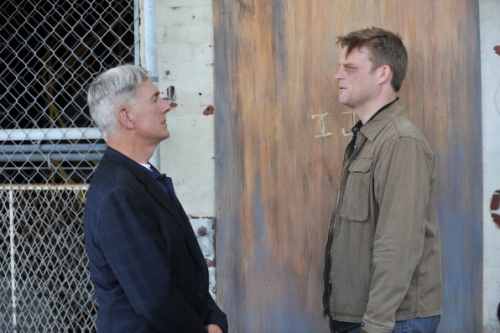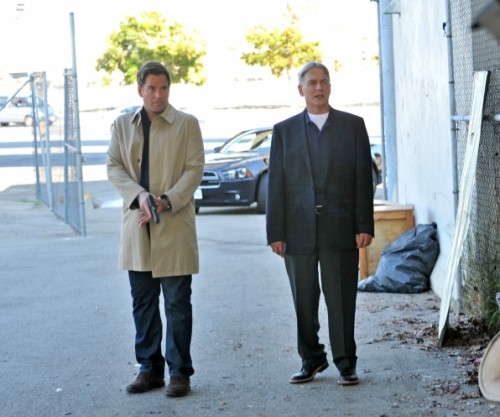NCIS, Season 10, Episode 6: “Shell Shock (Part I)”
Written by Nichole Mirante-Matthews
Directed by Leslie Libman
Airs Tuesdays at 8pm (ET) on CBS
Television has the potential to influence millions of people, for better or for worse. One of the best things about the medium is that not only does it entertain, but it can also teach and enlighten. Many shows have used their wide reach to inspire self-expression (Glee) or educate and increase awareness for certain issues and illnesses (House M.D.), even contributing to charities and foundations established to promote well-being and better living. With “Shell Shock (Part I)”, NCIS spotlights a condition that has increasingly gained attention for its negative effect on soldiers returning from duty overseas, Post-Traumatic Stress Disorder.
Like most veterans, Captain Joe Wescott, (played by Brad Beyer), carries with him painful memories from his time served in the armed forces. His mental state is noticeably unbalanced, a few telltale signs are observed by Agent Gibbs in interrogation when he questions Westcott about the death of his friend, Lieutenant Michael Torres, who was killed the night before. Westcott tells Gibbs that he and his friend had been together when a fight broke out which left Torres dead and himself bloodied and bruised. Westcott has trouble piecing the night together, but he is adamant that they were attacked by multiple assailants. When Ducky confirms that there were fewer attackers than the troubled man says, the agency begins to doubt his innocence.
His confusion and nervous ticks immediately give him away as a possible conspirator. Beyer does well in his profession, switching from manic hyper-vigilance to dazed and expressionless on cue- almost a little too “on the nose”- but it’s well-done, nevertheless. The need for spontaneous outrage or sorrowful glances is more important than the actual portrayal; there is a point that needs to be made: people who fight to protect our freedom need people to fight to protect their humanity and preserve their sanity. They cannot do life after war on their own. The revelation Wescott experiences about his illness is the main focus. There is a journey everyone must take to overcome their pride in order to accept help from someone else.
A scene in the conference room illustrates how oblivious people can be about the unseen injuries soldiers suffer, often silently. Wescott’s brother, also a soldier, and his father struggle to identify with their family member’s revealed issues, though the brother comes to terms with it much easier than the father, whose own emotional reservations prevent him from allowing his concern to make itself known. His own pride comes off as judgmental when he jumps to conclusions about his son’s state of mind, seeing him as weak instead of in need of moral support through this difficult time.
Mark Harmon handles most of the scenes with Wescott, sometimes accompanied by Michael Weatherly as Agent DiNozzo, but the connection between Wescott and Gibbs lays the foundation for Wescott’s rehabilitation. As Gibbs relates to Wescott, the team worries that he’s become too close to their suspect, though it’s all for the best. While Gibbs builds trust with Wescott, DiNozzo builds trust with Ziva in the B story.
DiNozzo comes in to work having taken home the wrong work bag the night before. He switches back with McGee only to find that the once-probie agent has swiped a photo from his boarding school years, which then makes the rounds in the office. After a few jabs from Ziva about his “homely” boyhood appearance, DiNozzo struggles with sharing the rest of the pictures from his old camera, a relic that he brings in for Abby to develop the rest of the film. Ziva and Tony share a private moment in the break-room, (much to the delight of fans who cheer for a coupling of the two), where Tony confides in Ziva about his mother, who passed away when he was a child. While that part of Tony’s childhood has been alluded to before, the scene does much to create a character from a memory, giving Tony’s mother a personality and a history that also contributes to his own development as a character. We see his relationship with Ziva take yet another turn into more personal territory, though it stops short right where it needs to, leaving the intimacy on the brink of romance, a strong friendship with a world of possibilities.
Right when it is apparent that Wescott has been unwell for months and most definitely hallucinated an attack in the alley , the team finds out that he may have seen more than than can be explained by PTSD. In fact, there actually was a villainous figure in the alley that night and he has yet to be foiled by the MCRT.
To Be Continued…
Compared to the memorable events from seasons past (“Kill Ari”, “Legend”), “Shell Shock” (or at least the first part) lives up to the standards upheld by the writers and the viewers in its honest discussion of a serious issue effecting many people in the world and its integrity in exposing the difficulty of living with the effects, both as the person in need of help and their family.
Whether or not they fully understand the severity of the condition, people need to become more familiar with this disorder so they can be more aware of those around them who may be suffering or get help if they themselves are in need. It may not be specific to each person who watches, but for anyone who does take the message of hope to heart, then clearly it is worth the effort put into the episode which presents the reality that there is a life beyond pain if you reach out and face the fear and know that you don’t have to do it alone.





